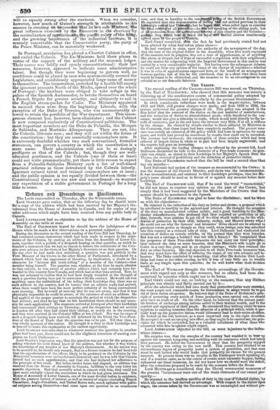In Portugal, revolution has placed a Chartist Cabinet in office,
and exiled the Cabrals. The Ex-Ministers held their places in virtue of the support of the military and the masonic lodges. -.Their career was boldly and openly unconstitutional : their last measures, however, appeared to indicate some administrative talent. But though they were beginning to govern well, no confidence could be placed in men who systematically coerced the Legislature, and scandalously appropriated large sums of money to themselves. The insurrection, provoked by a health bill among The ignorant peasants North of the Minho, spread over the whole of Portugal : the brothers were obliged to take refuge in the palace of the Spanish Ambassador, to betake themselves on board a French frigate for greater security, and ultimately to sail in the English steam-packet for Cadiz. The Ministers appointed to succeed them were from the beginning Liberals, with *the exception of the Duke of Terceira, who was unaecountably al- lowed to retain the portfolio of the War department. This incon- gruous element has, however, been eliminated ; and the Cabinet is now composed exclusively of Constitutional politicians. The most important members are the Duke de Palmella, the Marquis de Saldanha, and Martinho Albuquerque. They are not, like
• the Cabrals, illiterate men ; and they will act within the forms of the constitution : but they are essentially commonplace men. It is extremely doubtful whether two such conventional, formalist itatesnien, can govern a country in which the constitution is a' mere name. Their administration will not be so daringly profligate as that of the Cabrals; but, though 'they are well- educated gentlemen, and the Cabrals (one of them at least) could not write grammatically, yet there is little reason to expect from a Palmella-Saldanha Ministry such a list of well-timed practical reforms as those introduced by the Cabrals latterly. Ignorant natural talent and trained commonplace are at issue ; and the public opinion is too equally divided between them—the Constitutional forms are too new and unconfirmed—to warrant any expectation of a stable government in Portugal for a long time to come.


















































 Previous page
Previous page